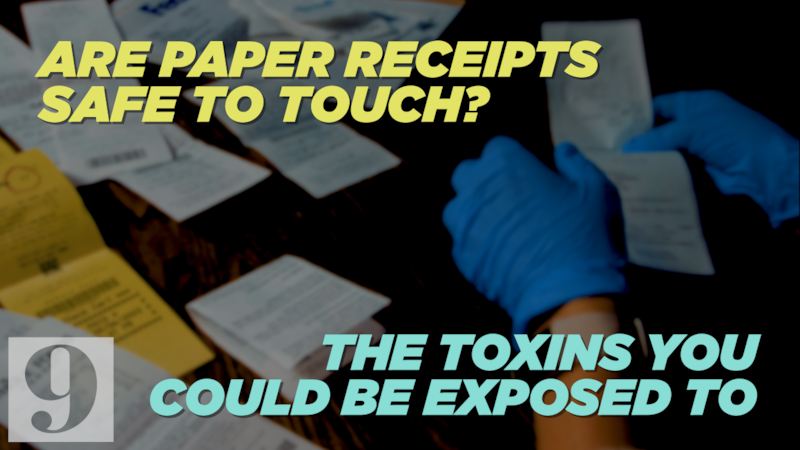ORLANDO, Fla. — A month’s long investigation by 9 Investigates is revealing potentially toxic chemicals in the receipts we all handle just about every day.
▶ WATCH CHANNEL 9 EYEWITNESS NEWS
The paper is banned in some parts of the world and is slowly being phased out. But in other places-- from grocery stores to restaurants and retailers-- we found the paper is still in use right here in Central Florida and across the country.
It’s the last thing you usually handle when buying something-- receipts.
The proof of payment comes in all lengths and styles, but most are printed using Thermal paper.
The paper uses heat, not ink to print.
9 Investigates, along with our Cox Media Group partners collected more than 240 receipts from 153 businesses across eight states.
Read: Extra fees: How much they’re costing you & how to save money
More than 30 were collected from Central Florida.
We carefully packed them up and put them to the test by shipping them to the Ecology Center in Ann Arbor, Michigan.
There, scientists like Gillian Miller checked for chemicals called bisphenols like BPA.
“If you touch this coated surface, it’s on your fingers guaranteed it’s not bound to anything. It’s actually in quite high concentration and comes off on to everything,” Miller said.
The chemicals come off on your wallet, food, and hands, and ultimately, it’s absorbed into your skin. Our testing lab found less than three percent of receipts had BPA. All were from “mom and pop” shops.
Read: Social Security Overpays Billions of Dollars to Americans — Then Asks for the Money Back
But the majority of the receipts collected, 80 percent, had another kind of bisphenol known as BPS, a cousin to BPA, including from major retailers and restaurant chains like Publix, Kroger, Home Depot and McDonalds.
“A number of years ago, Bisphenol A became well known enough that products using BPA or Bisphenol A started substituting in a similar chemical called bisphenol S or BPS which actually turns out to be a similarly hazardous chemical,” Miller said.
“When they get into our bodies, they act like estrogen and disrupt other hormones in our bodies,” said Laura Vandenberg, endocrinology professor at the University of Massachusetts.
Receipt collection by Jason Kelly on Scribd
She warns these chemicals have been found to cause reproductive harm and contribute to hormone-mediated diseases like diabetes and thyroid conditions.
“When we look at people who have higher levels of exposure, they’re more likely to have metabolic diseases, they’re more likely to have neurological conditions, they’re more likely to develop certain cancers and fertility problems,” Vandenberg said.
It can affect consumers - but is more dangerous to retail workers who can handle dozens, even hundreds of receipts.
“There are studies that look at bodily fluids, like blood or serum, or urine of workers after work shift people who handle receipts and there’s a spike in BPS. So it’s very clear that the chemicals come off the receipts very easily,” Vandenberg said.
THE SOLUTION
9 Investigates found some national retailers’ receipts did not contain any bisphenols-- including those at CVS, Starbucks, Trader Joes and Whole Foods.
Other retailers, like Walgreens and Target, have vowed to move away from using these chemical sin receipt paper. We found only one of our six Target receipts contained BPS.
Some states are looking to ban the use of bisphenols in receipt paper, like Connecticut did back in 2011.
Washington state’s ban is set to go into effect in 2025.
Meanwhile, other retailers like Dicks and Wal-Mart have begun to ditch the paper receipt in favor of an email or text.
“The change isn’t going to be in the chemistry. The change is going to be by not needing a paper-based receipt, by getting it emailed to us,” Vandenberg said.
Experts say the best advice is to say ‘no’ to the receipt and get it text or emailed to you.
With that, technology is really starting to make paper obsolete. Not only does it cost less to send a text or email, it reduces the time it takes to check out.
So what if you touch a receipt? Or if you have to deal with receipts because of your job?
The best advice is to fold them ink side in. The chemicals are found on that side. Then, make sure to wash your hands with soap and water. These chemicals soak into your skin.
Also, don’t use hand sanitizer or moisturizer when you’re handling receipts because it actually allows those chemicals to soak in even easier.
For retail workers, another option is to wear gloves.
Click here to download our free news, weather and smart TV apps. And click here to stream Channel 9 Eyewitness News live.
©2023 Cox Media Group






